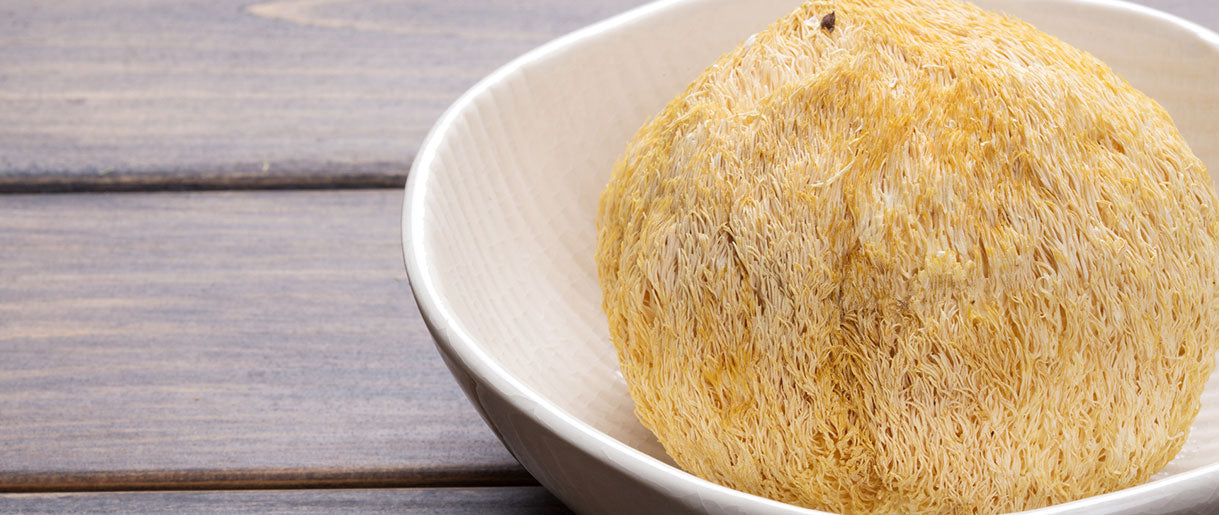Over the years, nutrition science has illuminated the potential health benefits of mushrooms, presenting them not just as culinary delights but as a functional food source with an array of essential nutrients. From supporting a healthy immune system to potentially boosting brain function, these humble fungi have much to offer. One lesser-known but equally intriguing aspect of mushrooms is their potential role in supporting muscle growth.
Mushrooms can contribute to muscle growth due to their unique nutritional profile. They're rich in protein, essential for muscle repair and growth, and provide vital minerals like potassium and magnesium that help muscle function. Some mushrooms, such as Cordyceps, can potentially enhance ATP production, aiding energy metabolism, while Lion's Mane may stimulate nerve growth factors supporting muscle development.
Additionally, mushrooms like Shiitake are an excellent source of Vitamin D, which is crucial for bone and muscle health. Incorporating a variety of mushrooms into your diet, or taking mushroom supplements, along with regular exercise and a balanced diet, could contribute to muscle growth.
In this article, we aim to explore the science behind the benefits of mushrooms for muscle growth. We will delve into the specific mushrooms that may support muscle growth and guide you on effectively incorporating them into your diet.
The Intricacies of Building Muscle: Unveiling the Role of Nutrition and Medicinal Mushrooms

The Biology Behind Muscle Growth
Muscle growth, often referred to as hypertrophy, involves an increase in the size of muscle cells. This growth primarily occurs when you engage in strength training activities that strain and break down muscle fibers.
During the muscle recovery phase, these damaged fibers repair and grow back stronger, increasing muscle mass. It's a physiological adaptation to meet the demands of more rigorous activities—nutrition plays a pivotal role here.
Building Muscle: Why Does It Matter?
Building muscle goes beyond aesthetic appeal. An increased muscle mass improves overall health and fitness by enhancing exercise performance, supporting healthy bone density, and increasing metabolism, which can help manage body weight. Muscle growth also helps maintain functional abilities as we age, reinforcing the significance of building muscle in every stage of life.
The Fuel of Muscle Growth: Emphasizing Nutrition's Role
In the quest for muscle growth, nutrition is just as crucial as the workout. A balanced diet, rich in protein, carbohydrates, and essential minerals, supports muscle recovery, thus promoting growth.
Increased blood flow and enough red blood cells for oxygen uptake during exercise are essential for delivering these nutrients to your muscles, aiding muscle recovery. Interestingly, an often-overlooked source of these nutrients is edible mushrooms.
The Power of Medicinal Mushrooms in Muscle Growth
Incorporating medicinal mushrooms into your diet provides a natural, nutrient-dense food source supporting muscle-building. These edible fungi are rich in protein, essential for muscle recovery and growth, and essential minerals that aid in various body functions. Certain types of medicinal mushrooms have also been linked to increased testosterone production, which plays a significant role in regulating cell growth and building muscle.
Boosting Exercise Performance with Mushrooms
Muscles need fuel to perform and recover. As such, nutrients from medicinal mushrooms can potentially enhance exercise performance by helping to delay muscle fatigue, extending the exercise duration. A post-workout serving of these nutrient-rich mushrooms can contribute to faster muscle recovery and support the repair process.
The Unseen Benefits: From Strength Training to Post-Workout Recovery
Through strength training, you cause microscopic damage to muscle fibers, which then repair and grow back stronger during the muscle recovery phase. Medicinal mushrooms, rich in nutrients, can contribute to exercise performance during your workout and the post-workout muscle recovery phase. Their potential ability to increase blood flow and testosterone production can make a significant difference in building muscle.
Unmasking the Nutritional Value of Mushrooms: A Potential Ally for Muscle Growth

Mushrooms as a Powerhouse of Nutrition
Mushrooms for muscle growth may not be the first thing that comes to mind when you think of food sources that can help build muscle, but these fungi's nutritional content might surprise you. Often underestimated, mushrooms contain a wealth of nutrients that promote health and support muscle growth and endurance—as an example, check out the nutritional values of maitake mushrooms.
Decoding the Nutritional Content of Mushrooms
When you delve into the nutritional value of mushrooms, you'll find a spectrum of elements that are beneficial to your health and muscle growth. Organic mushrooms are a remarkable source of protein, vitamins, minerals, and antioxidants, each playing a distinct role in your body's function and well-being.
Proteins
Proteins are the building blocks of muscles, and mushrooms contain a good amount. Consuming protein-rich foods like medicinal mushrooms can support muscle growth and recovery.
Vitamins
Mushrooms contain various vitamins, notably B vitamins such as B2 (riboflavin), B3 (niacin), and B5 (pantothenic acid), which are key players in cellular energy production. Mushrooms also contain vitamin D, which supports bone health and muscle function.
Minerals
Rich in minerals like potassium, copper, and selenium, mushrooms contribute to several bodily functions, including maintaining muscle health and endurance.
Antioxidants
Mushrooms are known for their high antioxidant capacity. Antioxidants help reduce inflammation and combat oxidative stress, improving muscle recovery and growth.
How Mushrooms' Nutritional Content Can Enhance Muscle Growth
The combination of these nutrients makes mushrooms a potential aid for muscle growth. The proteins provide essential amino acids for muscle repair and growth, while the vitamins and minerals support functions like energy metabolism and muscle contraction. Plus, the antioxidants in medicinal mushrooms contribute to faster recovery by reducing inflammation and muscle damage from intense workouts.
The Benefits of Increased Energy and Endurance
A diet rich in mushrooms can also contribute to increased energy and better muscle endurance, thanks to their role in cellular energy production. The nutritional content of mushrooms, especially medicinal varieties, offers a natural way to boost energy levels, significantly enhancing exercise performance.
The Mighty Fungi: Impact of Specific Mushrooms on Muscle Growth

Lion's Mane: The Nerve Growth Factor Booster
Lion's Mane, or the dietary Yamabushitake mushroom, is known for stimulating Nerve Growth Factor (NGF). Lion's mane neurogenesis increases the production of NGF in the brain.
NGF is crucial for the growth, maintenance, and survival of certain target neurons, potentially aiding muscle development and coordination. These mushroom benefits may not directly contribute to muscle mass but support the overall physiological functions vital for strength training and sports performance.
Reishi: The Immune Booster for Optimized Workouts
Reishi mushroom, or Ganoderma Lucidum, is a medicinal mushroom prized for its immune-boosting properties. A strong immune system supports consistent and intense workouts by keeping you healthy and reducing downtime due to illness.
Some research(1) suggests that one of the benefits of Reishi is that it can also support heart health by helping regulate blood pressure and blood sugar. The blood pressure and diabetes benefits of Reishi could indirectly improve exercise performance.
Cordyceps: The Energy Enhancer
Cordyceps mushroom, widely used by Chinese athletes, has garnered attention for its potential to enhance ATP (adenosine triphosphate) production. ATP is the primary energy source for muscular contractions; hence more ATP equates to more energy for workouts. This indicates that cordyceps can boost energy during workouts, making it one of the best cellular energy production mushrooms.
Some studies(2) on cordyceps supplementation indicate improved sports performance, less fatigue, and more efficient post-workout recovery. Given these benefits, cordyceps is a potent pre-workout product and supplement.
Shiitake: A Source of Vitamin D for Muscle Function
Shiitake is another mushroom species valued for its health benefits, particularly its vitamin D content. Vitamin D is essential for bone health and affects muscle function. It may even influence muscle mass, making Shiitake an exciting part of a healthy diet for muscle growth.
Chaga: The Antioxidant Powerhouse for Muscle Health
Chaga is a type of medicinal mushroom known for its high antioxidant capacity. Antioxidants are vital for health as they combat oxidative stress, common during intense physical activities that can result in muscle damage and prolonged recovery times. By reducing oxidative stress, Chaga mushrooms may help speed up muscle recovery post-workout, paving the way for consistent training sessions and potential muscle growth.
Furthermore, some research suggests(3) that the polysaccharides present in Chaga mushrooms can help regulate blood sugar levels and improve endurance. Stable blood sugar helps maintain energy levels during workouts, allowing for prolonged intensity and potentially contributing to muscle growth. It is worth noting that Chaga is often used for diabetes because of its potent blood sugar management capabilities.
The Science Behind Mushroom Benefits for Muscle Growth
Numerous scientific studies shed light on the potential of medicinal mushrooms for muscle growth. For instance, research on cordyceps muscle growth found that regular cordyceps extract supplementation could improve exercise performance, reduce body fat during the cutting phase, and support post-workout recovery.
These studies also highlight cordyceps mushroom as a functional food with low-calorie content and potential benefits beyond muscle growth, such as supporting red blood cell function and reducing lactic acid build-up.
Mushroom Products: A Versatile Addition to Your Fitness Regimen
Incorporating these medicinal mushrooms into your fitness routine can be as simple as adding them to your diet or opting for mushroom supplements. The potential mushroom benefits are plentiful, from pre-workout energy boosts to post-workout recovery support.
Remember, while these fungi can be a supportive part of your fitness journey, they're not a stand-alone solution. Balanced nutrition, regular exercise, and adequate rest are equally essential.
Making the Most of Mushrooms: Incorporating Them into Your Diet for Muscle Growth

Savoring Mushrooms for Maximum Nutritional Benefit
For those considering mushrooms for muscle growth, there are several ways to include these functional mushrooms in your diet. Medicinal mushrooms can be sautéed, grilled, baked, or even consumed raw in salads, making them versatile low-calorie foods.
Whether you're consuming Reishi, Cordyceps, or any other species, cooking them properly to unlock their full nutritional potential is essential. Some mushrooms, like the cordyceps sinensis, can also be brewed into a mushroom tea, providing a warming, nutritious beverage post-workout.
The Power of Mushroom Supplements
For those who may not be fond of the taste of mushrooms, mushroom products like supplements are an excellent alternative. Mushroom supplements, available in powder or capsule form, offer the same potential benefits as their fresh counterparts, making them a convenient addition to your muscle growth regimen. For instance, cordyceps muscle growth supplements can provide concentrated benefits, helping to boost your energy levels and support post-workout recovery.
Precautions and Recommended Doses
While incorporating medicinal mushrooms into your diet can offer various health benefits, following the recommended doses is essential. Like any supplement, an overdose can lead to side effects, so it's best to start with a small dosage and gradually increase it as your body adjusts. Also, if you have any underlying health conditions or are currently taking medication, it's advised to consult with a healthcare professional before adding mushroom supplements to your diet.
FAQs About Mushrooms for Muscle Growth
Is Mushroom Good For Males?
Yes, mushrooms have benefits for men. Some research suggests that regular consumption of mushrooms may help reduce the risk of prostate cancer, a significant concern for men over 50. Additionally, due to their high fiber, potassium, and vitamin C content, mushrooms support cardiovascular health—a key consideration as heart disease remains a leading cause of death among men. They also serve as a low-calorie, high-fiber food option that can aid in weight management, reducing the risk of related health conditions like diabetes and heart disease.
Regarding fitness and muscle development, certain mushrooms like cordyceps and Reishi could potentially aid in muscle growth and recovery, making them a beneficial addition to a fitness-focused diet for men. Moreover, medicinal varieties of mushrooms are known for their immune-boosting properties, helping to strengthen the body's defenses. However, mushrooms should be part of a balanced diet complemented by regular exercise, adequate sleep, and regular health check-ups for overall well-being.
Is Lion's Mane Good For Bodybuilding?
While Lion's Mane is not traditionally associated with bodybuilding like protein powders or creatine supplements, it does have some properties that could indirectly support a bodybuilding regimen.
Firstly, Lion's Mane is known for its potential cognitive benefits—Lion's Mane promotes memory and enhances overall cognition. It has been shown to stimulate Nerve Growth Factor (NGF) production, which can help improve focus, mental clarity, and memory. For bodybuilders, improved mental clarity and focus can enhance workout intensity and efficiency.
Additionally, Lion's Mane may help with nerve health and recovery. Intense workouts often stress the nervous system and faster nerve recovery can lead to better performance and reduced downtime.
Lastly, while Lion's Mane is not a significant source of protein—the essential nutrient needed for muscle repair and growth—it is a low-calorie, nutrient-dense food that can fit nicely into a balanced bodybuilding diet.
Are Mushrooms Good To Eat After A Workout?
Mushrooms can be an excellent addition to a post-workout meal, but they shouldn't be the only component. While they are a source of many vital nutrients, including B vitamins, antioxidants, and essential minerals, they don't contain a high amount of protein, a crucial macronutrient needed for muscle recovery and growth after a workout.
Certain types of mushrooms, such as cordyceps, are believed to have properties that may support faster recovery and reduce fatigue. Additionally, mushrooms can help combat oxidative stress due to their high antioxidant content, a common occurrence after intensive workouts.
Therefore, consider pairing mushrooms with high-protein foods in your post-workout meal. You could add them to a stir-fry with lean red meats or tofu or mix them into a pasta dish with a protein-rich sauce. This way, you can benefit from the unique mushroom nutrients while getting the protein your muscles need to recover and grow.
Key Takeaways
Our exploration into the world of mushrooms and muscle growth has unveiled the remarkable potential of these humble fungi. From their beneficial nutrients like proteins, vitamins, and minerals, to their unique properties found in medicinal varieties like Lion's Mane, Reishi, and Cordyceps, mushrooms offer a variety of health benefits that can potentially aid in muscle growth and recovery.
It's clear that whether through a stir-fry, a cup of tea, or a supplement, mushrooms can be a valuable addition to your muscle-building regimen. However, while mushrooms are packed with nutrients, they are not a magic solution for muscle growth. Building muscle is a complex process that requires balanced nutrition, consistent training, and adequate rest. So, while mushrooms can be an excellent addition to your diet, they should be used as part of a broader strategy for muscle growth and overall health.
Do you have any thoughts, questions, or personal experiences with mushrooms and muscle growth? We'd love to hear them! Don't hesitate to share your mushroom muscle-building stories or ask any questions. After all, we're all here to learn, grow, and support each other on our fitness journeys.
References
- The beneficial effects of Ganoderma lucidum on cardiovascular and metabolic disease risk, (1)https://www.ncbi.nlm.nih.gov/pmc/articles/PMC8409941/
- Cordyceps militaris improves tolerance to high intensity exercise after acute and chronic supplementation, (2)https://www.ncbi.nlm.nih.gov/pmc/articles/PMC5236007/
- Anti-diabetic effects of Inonotus obliquus polysaccharides in streptozotocin-induced type 2 diabetic mice and potential mechanism via PI3K-Akt signal pathway, (3)https://pubmed.ncbi.nlm.nih.gov/28954386/










Let Us Know Your Comments